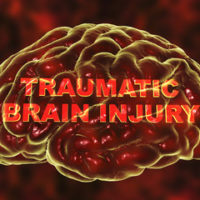TRAUMATIC BRAIN INJURIES MAY BE INVISIBLE, YET LIFE – ALTERING

Sometimes, when there’s a hard blow or jolt to the head, the skull remains intact, and the extent of the injury is invisible from the outside. In fact, one of the most common forms of closed-head injury is concussion. There may be no noticeable scars, bruises, or bleeding, but what has happened inside the brain can be life-changing, resulting in delayed symptoms such as:
- memory loss
- shortened attention span
- loss of reading and writing skills
- seizures
- speech problems
- coordination problems
What has actually happened, the Centers for Disease Control and Prevention explain, is that a bump, blow, or jolt to the head has caused the brain to move rapidly back and forth, bouncing around or twisting inside the skull, creating chemical changes in the brain, and sometimes stretching and damaging brain cells. Concussions are usually not life-threatening, but the effects, as shown above, can be very, very serious.
Some concussions cause you to lose consciousness, but most do not, Mayo Clinic doctors explain, and it’s very possible to suffer a concussion and not realize it. After any car collision or blow during a contact sport, therefore, it’s always a good idea to get checked by a doctor. Some immediately apparent symptoms (in addition to the long-term effects listed above) might include:
- dizziness or “seeing stars”
- headache or feeling of pressure in the head
- confusion (feeling “in a fog”)
- nausea and vomiting
- slurred speech
- fatigue
If you’ve suffered a concussion injury with longer term effects as a result of someone else’s negligence, you can turn to the legal system for financial help. As the plaintiff in a personal injury case, just how much help can you hope for? As a personal injury attorney in Indiana for more than forty years, I can tell you that the answer to that question will be heavily dependent on how your “pain and suffering” is calculated.
What exactly does that term “pain and suffering” mean and how is it measured?
The law recognizes two types of pain and suffering:
- Physical: This refers to the discomfort you felt and that you continue to feel as a result of your injuries, but also includes any negative effects the injury may cause you to suffer in the future.
- Mental: A serious personal injury affects your emotions and your thinking as well as your body. Fear, anger, anxiety, shock, sexual dysfunction, even humiliation can be a big part of the overall damage you suffered due to becoming injured. And, like the effects of physical injuries, emotional injuries can be prolonged and even lifelong.
In truth, it’s difficult, perhaps even impossible, for any one person, any one lawyer, any one judge, even a jury, to measure the extent to which someone else is suffering. Any measurement done relates to money matters:
- expenses incurred (medical care and rehabilitation bills, both so far and those anticipated in the future)
- earnings lost (both so far and those anticipated in the future).
To be able to make a personal injury claim after suffering a concussion, you’ll need to prove someone else was responsible for the accident. To do that, you’ll need medical evidence to back up your statements. A plaintiff can claim damages only if there is documentation that a medical opinion connects his or her injury to that incident. The “incident” might involve:
- a car collision
- a sports injury
- a fall
Remember, it may or may not be possible to prove that any of these was the fault of a driver other than yourself, the fault of the owner of a store or office building, the fault of a sports equipment manufacturer, or even the fault of a team player who was unreasonably aggressive outside the normal rules of the game. Not every doctor is knowledgeable in concussion-related care and patient outcomes; not every personal injury attorney is experienced enough to help obtain the necessary expert medical opinions and go up against a big insurance company with its team of lawyers.
Traumatic brain injuries may be invisible, yet life-altering, and, as personal injury attorneys, we help concussion sufferers get the compensation they need – if indeed some other person or entity can be proven liable. For us, it’s not just about the money, but about helping injured people put their lives back together.




